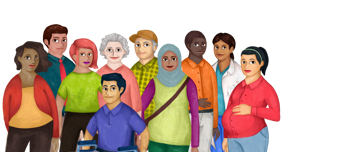Our recent publication in Nature, “Genomic Data in the All of Us Research Program,” has sparked criticism about how we represented race, ethnicity, and genetic ancestry in highlighting the rich diversity of All of Us’ genomic dataset. Several researchers and community partners accurately pointed out flaws in the paper. In particular, a figure and its related labels and text unintentionally conflated race and ethnicity with genetic ancestry.
We apologize for these mistakes, and agree that we can, and should, do better. Indeed, we did not follow best practices, which we helped establish through the funding and development of a 2023 National Academies of Science, Engineering, and Medicine (NASEM) report, “Using Population Descriptors in Genetics and Genomics Research.”
We are taking several steps to correct the publication and help prevent such errors in the future. First, since we became aware of the problems, we have been in close communication with Nature to determine a path forward in making revisions. A key issue was the use of a tool called Uniform Manifold Approximation and Projection for Dimension Reduction, or UMAP. This is a technique for representing highly complex information in a two-dimensional way. We analyzed genetic ancestry (a computed biological factor) alongside participants’ self-reported race and ethnicity (social concepts). All of these variables are important for different kinds of health research, but they are not the same, and we failed to offer enough context to make this distinction. Further, the rendering of these data on a UMAP graph could give people the wrong impression that populations fall into discrete biological categories, when that’s not the case. As a research program, we strive to disentangle and accurately represent different aspects of diversity. With this figure, we fell short.
We will replace the figure and update the text so that our data and findings are clear and reflect the recommendations of the NASEM report. These revisions will be peer reviewed prior to their publication.
Second, we are refining our internal processes for publications to ensure more inclusive authorship. All of Us’ consortium is comprised of people from many different communities who bring a range of expertise. Their diverse contributions elevate our work and advance science. It is important to include multiple perspectives in the development of our publications, including experts in the ethical, legal, and social implications of biomedical research.
Third, we are enhancing review of program publications going forward so that they fully align with our policies and principles for the responsible conduct of research. This will involve more consultation with All of Us’ Resource Access Board (RAB), a special group of participant representatives and experts in human subjects research, research ethics, privacy and security, and various scientific domains. We are currently expanding the membership of our RAB to increase its capacity to review more studies across different topics.
We are grateful for the feedback we received, and we are committed to learning and improving. Further dialogue is critical to understand how best to analyze diversity in research datasets, to unravel the intersections of genes, environment, and life circumstances.
We look forward to remaining an engaged partner in these efforts and using this moment as an opportunity to contribute to ongoing conversations about how research can advance health equity for all.
